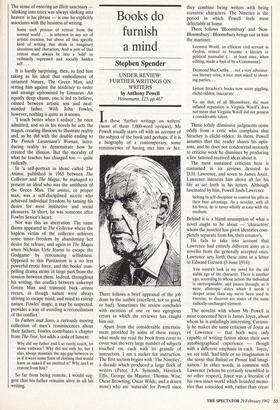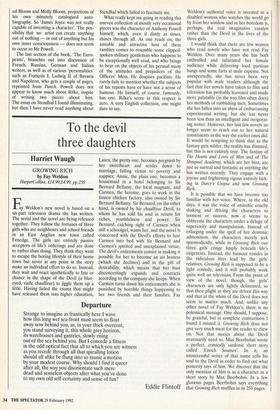Books do furnish a mind
Stephen Spender
UNDER REVIEW: FURTHER WRITINGS ON WRITERS by Anthony Powell Heinemann, £25, pp.467 In these 'further writings on writers' (most of them 1,000-word reviews), Mr Powell usually starts off with an account of the subject of the book and perhaps, if it is a biography of a contemporary, some reminiscence of having met him or her.
There follows a brief appraisal of the job done by the author (excellent, not so good, or bad). Sometimes the review concludes with mention of one or two egregious errors in which the reviewer has caught him out.
Apart from the considerable entertain- ment provided by some of these essays, what made me read the book from cover to cover was the very large number of subjects touched on, each with its granule of instruction. I am a sucker for instruction. The first section begins with 'The Nineties', a decade which produced a large flock of writers (Pater, J.A. Symonds, Havelock Ellis, George du Maurier, Thomas Wise, Oscar Browning, Oscar Wilde, and a dozen more) who are 'naturals' for Powell since they combine being writers with being eccentric characters. The Nineties is the period in which Powell feels most delectably at home.
There follows 'Bloomsbury' and 'Non- Bloomsbury'. Bloomsbury brings out in him the martinet:
Leonard Woolf, an efficient civil servant in Ceylon, retired to become a literary or political journalist (.. . at least once, when editing, made a fool of by a Communist).
Desmond MacCarthy... not a very adventur- ous literary critic, a nice man asked to shoot- ing parties...
Lytton Strachey's books now seem giggling, cliché-ridden, inaccurate.
To say that, of all Bloomsbury, the most inflated reputation is Virginia Woolf's does not mean that Virginia Woolf did not possess a considerable talent.
These loftily dismissive judgments come oddly from a critic who complains that Strachey is cliché-ridden. In them, Powell assumes that the reader shares his opin- ions, and he does not condescend seriously to criticise work he dismisses by producing a few tattered received ideas about it.
The most sustained criticism here is contained in six reviews devoted to D.H. Lawrence, and seven to James Joyce. Lawrence interests him above all for his life as set forth in his letters. Although fascinated by him, Powell finds Lawrence
lacking in self-discipline to control his gifts to their best advantage. As a novelist, with all his force, he is never wholly at ease with the medium.
Behind it is a bland assumption of what a novel ought to be about — 'characters' whom the novelist has given identities com- pletely separate from his, their creator's.
He fails to take into account that Lawrence had entirely different aims as a novelist from the generally accepted ones. Lawrence sets forth these aims in a letter to Edward Garnett (5 June 1914):
You mustn't look in my novel for the old stable ego of the character. There is another ego, according to whose action the individual is unrecognisable, and passes through, as it were, allotropic states which it needs a deeper sense than any we've been used to exercise, to discover are states of the same radically-unchanged element.
The novelist with whom Mr Powell is most concerned here is James Joyce, about whom he is unfailingly interesting. Curious- ly he makes the same criticism of Joyce as of Lawrence — that both were only capable of writing fiction about their own autobiographical experience — though with a different emphasis in each. 'Joyce,' we are told, 'had little or no imagination in the sense that Balzac or Proust had imagi- nation.' In other words, in common with Lawrence (whom he certainly resembled in no other respect), Joyce was a literalist of his own inner world which hoarded memo- ries that coincided with, rather than creat- ed Bloom and Molly Bloom, projections of his own minutely catalogued auto- biography. So 'James Joyce was not really capable of inventing a character'. The pos- sibility that no artist can create anything out of nothing — or out of anything but his own inner consciousness — does not seem to occur to Mr Powell.
The last section of the book, 'The Euro- peans', branches out into discussion of French, Russian, German and Italian writers, as well as of various 'personalities' such as Francois I, Ludwig II of Bavaria and Napoleon, who gets a couple of pages, reprinted from Punch. Powell does not appear to know much about Rilke, inspite of writing two pieces about him. The essay on Stendhal I found illuminating, but then I have never read anything about
Stendhal which failed to fascinate me.
What really kept me going in reading this uneven collection of mostly very occasional pieces was the character of Anthony Powell himself, which, even if dimly at times, shines through all. As one reads on, the amiable and attractive host of these rambles comes to resemble some clipped- spoken military gentleman who happens to be exceptionally well read, and who brings to bear on the objects of his perusal many of the attitudes and prejudices of the Officers' Mess. He despises pacifists. He rarely fails to mention whether the subjects of his reports have or have not a sense of humour. He himself, of course, famously, has one. Rilke's score in this respect is zero. A very English collection, one might dare to say.



















































 Previous page
Previous page